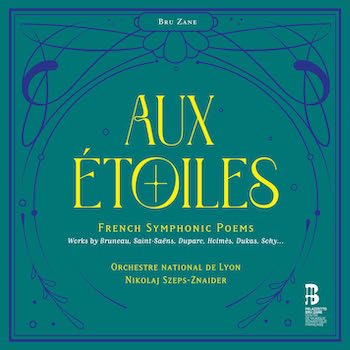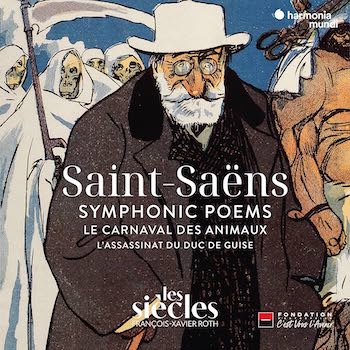Classical Album Reviews: “Aux étoiles” and Saint-Saëns’ Symphonic Poems
By Jonathan Blumhofer
Spiffy discs of French music featuring the Orchestre National de Lyon led by Nikolaj Szeps-Znaider and François-Xavier Roth and Les Siècles.

French composers of the last two centuries have excelled at program music. While several notable pieces have become repertoire staples, many more have passed under the radar.
Examples of both turn up in Aux étoiles, Bru Zane’s recent two-disc release featuring the Orchestre National de Lyon led by Nikolaj Szeps-Znaider. This is a release that takes the big view, offering a panorama of Gallic symphonic poems and overtures from the 19th– and early 20th-centuries.
A third of its fifteen items are familiar. There’s an invigorating account of César Franck’s Le Chasseur maudit to open things plus, later on, a lithe reading of Emmanuel Chabrier’s Espana and a lusty take on Camille Saint-Saëns’ Danse macabre. Paul Dukas’ L’Apprenti Sorcier is colorful and impish, if a bit restrained, while Lili Boulanger’s D’un matin de printemps shimmers.
Some of the more exotic fare emerges triumphantly. Vincent d’Indy’s Istar, with its sumptuous scoring and unexpected turns (like the strange, memorable – and long – unison melodic writing at the end) is a revelation. “La Nuit et l’Amour” from Augusta Holmès’ Ludus pro patria packs some Italianate passion and colors.
Striking, too, are Mel Bonis’ beautiful, Debussy-esque Le Rêve de Cléopâtre and Henri Duparc’s gorgeous title track with its lovely central string solos. Charlotte Sohy’s mysterious Danse mystique suggests a composer of real vision and originality.
At the same time, a handful of pieces here leave vaguer impressions. Alfred Bruneau’s La Belle au Bois dormant echoes Wagner and seems to anticipate Erich Wolfgang Korngold, but its musical arguments are bloated and aimless. New Orleans-born Ernest Guiraud’s Ouverture d’Arteveld boasts delicate textures and colors but is gesturally redundant and thematically unmemorable.
Ditto for Victorin Joncières La Touissant and Henri Rabaud’s La Procession nocturne, though the latter’s moments of warm sonority stand out well. So do the Iberian touches in Ernest Chausson’s Viviane.
Through it all, Szeps-Znaider draws playing of vigor and style from his players. The disc’s engineering – bright, clear, well-balanced – also aids in bringing out the charm and novelty of these selections.

In his eighty-six years, Camille Saint-Saëns wrote an awful lot of music. Some of it is of the first rank, some not.
One genre in which the composer excelled was the symphonic poem: Saint-Saëns wrote four of them, all in the mid-1870s. That tetralogy – plus the “Bacchanale” from Samson et Delila, The Carnival of the Animals, and the score to the film L’Assassinat du duc de Guise – are part of a substantial new, all-Saint-Saëns recording from François-Xavier Roth and Les Siècles.
The performances of the symphonic poems (Phaéton, La Jeunesse d’Hercule, Le Route d’Omphale, and Danse macabre) are altogether wonderful. Roth has a very clear sense of how these works should flow, which is to say that everything is very well directed and rhythmically precise.
Les Siècles’ period instruments – especially the brasses – bring a terrific brashness to the proceedings; the opening of Phaáton, for instance, is bracingly alive. True, the strings sometimes sound a bit lightweight and thin. But the play of instrumental colors and character on display in these performances largely carries the day.
Roth takes some time with the biggest number, La Jeunesse d’Hercule, though its big dynamic range and zippy Allegro are roundly convincing. So is the graceful, limber account of Le Route d’Omphale and the sensuous reading of the popular “Bacchanale.” Danse macabre is likewise well-balanced and shaped.
The group’s performance of Carnival – which employs a Pleyel double-piano – charms, and, though its musical qualities are rather lackluster, it’s a pleasure to hear Saint-Saëns’ score for the 1908 film L’Assassinat du duc de Guise. Perhaps the earliest film score (and certainly the first by a major composer), its most remarkable attribute is how much it simply sounds like film music of later decades.
Through it all, Roth and Les Siècles prove engaging, articulate, and involved guides. Overall, they sound like they’re having fun with and enjoying this fare. That aspect – which, for better or worse, isn’t always a quality associated with this music – comes over viscerally.
Jonathan Blumhofer is a composer and violist who has been active in the greater Boston area since 2004. His music has received numerous awards and been performed by various ensembles, including the American Composers Orchestra, Kiev Philharmonic, Camerata Chicago, Xanthos Ensemble, and Juventas New Music Group. Since receiving his doctorate from Boston University in 2010, Jon has taught at Clark University, Worcester Polytechnic Institute, and online for the University of Phoenix, in addition to writing music criticism for the Worcester Telegram & Gazette.
Tagged: Aux étoiles, Bru Zane, Francois-Xavier Roth, Harmonia Mundi, Les Siècles, Nikolaj Szeps-Znaider
